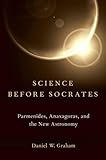Science before Socrates : Parmenides, Anaxagoras, and the new astronomy / Daniel W. Graham.
Material type: TextPublisher: Oxford ; New York : Oxford University Press, [2013]Description: xiii, 287 pages : illustrations, maps ; 22 cmISBN: 9780199959785Subject(s): Astronomy, Ancient -- Greece | Astronomy, Greek | Parmenides | Anaxagoras | Science -- Greece -- History -- To 1500 | Parmenides | Anaxagoras Clazomenius | Anaxagoras | Parmenides | Astronomy, Ancient | Astronomy, Greek | Science | Greece | Parmenides, v515-v445 | Anaxagoras Clazomenius, v500-v428 | Astronomie | Griechenland | To 1500Genre/Form: HistoryDDC classification: 520.938 LOC classification: QB21 | .G73 2013
TextPublisher: Oxford ; New York : Oxford University Press, [2013]Description: xiii, 287 pages : illustrations, maps ; 22 cmISBN: 9780199959785Subject(s): Astronomy, Ancient -- Greece | Astronomy, Greek | Parmenides | Anaxagoras | Science -- Greece -- History -- To 1500 | Parmenides | Anaxagoras Clazomenius | Anaxagoras | Parmenides | Astronomy, Ancient | Astronomy, Greek | Science | Greece | Parmenides, v515-v445 | Anaxagoras Clazomenius, v500-v428 | Astronomie | Griechenland | To 1500Genre/Form: HistoryDDC classification: 520.938 LOC classification: QB21 | .G73 2013| Item type | Current library | Call number | Copy number | Status | Notes | Date due | Barcode |
|---|---|---|---|---|---|---|---|
 Books
Books
|
Female Library | QB21 .G73 2013 (Browse shelf (Opens below)) | 1 | Available | STACKS | 51952000193395 | |
 Books
Books
|
Main Library | QB21 .G73 2013 (Browse shelf (Opens below)) | 1 | Available | STACKS | 51952000193388 |
Browsing Female Library shelves Close shelf browser

|

|

|

|

|

|

|
||
| QB15 .N486 2012 The astronomy revolution : 400 years of exploring the cosmos / | QB205 .A2 W85 2012 Chasing Venus : the race to measure the heavens / | QB209 .T484 2016 Time : a vocabulary of the present / | QB21 .G73 2013 Science before Socrates : Parmenides, Anaxagoras, and the new astronomy / | QB223 .O35 2015 The global transformation of time : 1870-1950 / | QB23 .B58 2016 Astronomy and astrology in the Islamic world / | QB35 .L82 2012 Pioneers of science / |
Includes bibliographical references (pages 261-274) and index.
Introduction: Cosmic Conjunctions -- Looking for Science. Unfounded Speculation ; Footnotes to Thales ; Footnotes to Pythagoras ; Science Without Knowledge ; History of Science Without History ; History of Science Without Science ; Old-Time History of Science -- Azure Pastures: An Early Ionian Model. Hesiod's Mythical Cosmography ; Ionian Theories ; The Meteorological Model -- Borrowed Light: The Insights of Parmedides. Fifth-Century Advances ; Three Insights: Heliophotism, Planetary Unification, Sphericity ; The Power of a Model ; Conjectures ; Conceptual Advances ; Conclusion -- Empire of the Sun: Implications of Heliophotism, and a New Model. Antiphraxis and Other Theoretical Implications ; A New Physics ; Anaxagoras' New Cosmology and Astronomy ; The Lithic Model -- Darkened Suns and Falling Stars: Heaven-Sent Proofs. Lives of the Eminent Philosophers ; Eclipses ; The Meteor ; The Comet ; The Nile Floods ; Conclusion: Theory and Evidence -- Lunar Revolutions: The Triumph of the New Astronomy. A Community Effort ; Anaxagoras' Theory ; Other Theories of the Fifth Century ; Characteristics of the Lithic Model ; The Doxography ; Plato's Heavenly Sphere ; Aristotle's Paradigm ; A Scientific Consensus -- The Geometry of the Heavens. The Story of Early Greek Astronomy ; Scientific Progress ; Historical and Philosophical Significance -- Appendix 1: Anaxagoras in the Historiography of Science -- Appendix 2: Science and History.
In this book, Daniel Graham argues against the prevalent belief that the Presocratic philosophers did not produce any empirical science and that the first major Greek science, astronomy, did not develop until at least the time of Plato. Instead, Graham proposes that the advances made by Presocratic philosophers in the study of astronomy deserve to be considered as scientific contributions. Whereas philosophers of the sixth century BC treated astronomical phenomena as ephemeral events continuous with weather processes, those of the fifth century treated heavenly bodies as independent stony masses whirled in a cosmic vortex. Two historic events help to date and account for the change: a solar eclipse in 478 BC and a meteoroid that fell to earth around 466. Both events influenced Anaxagoras, who transformed insights from Parmenides into explanations of lunar and solar eclipses, meteors, and rainbows. Virtually all philosophers came to accept Anaxagoras' theory of lunar light and eclipses.
1 2

There are no comments on this title.